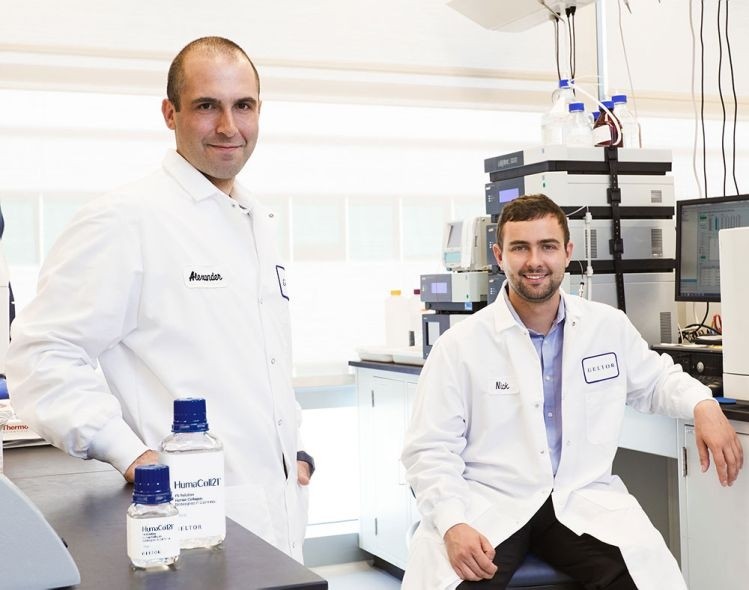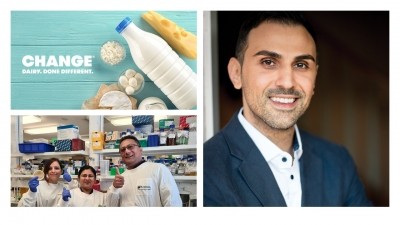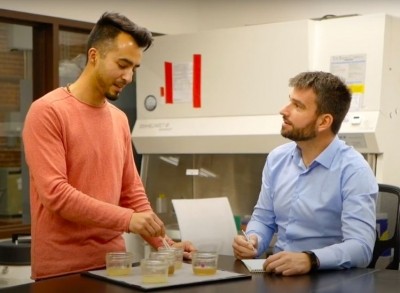Geltor raises $91.3m to expand animal-free collagen platform: ‘Our goal is to make it ridiculously easy for iconic brands to build sustainable products’

Returning investors in the round include Cultivian Sandbox, SOSV, and iSelect Fund, along with the investment arms of global ingredient technology companies GELITA and Archer Daniels Midland. New investors include Blue Horizon Ventures, RIT Capital Partners, Humboldt Fund, and Pegasus Tech Ventures.
The Series B brings the total funding raised for Geltor to $116.3m to date, and will help the firm - which has already increased its headcount from around 30 at the beginning of the year to 55 now – further expand its team, co-founder and CEO Alex Lorestani told FoodNavigator-USA.
“I think that the current public health crisis crystalized for investors the connection between the way we make protein and the future of industry,” he said, noting that COVID-19 likely spread to humans from an animal host, but like African Swine Fever, had also exposed the vulnerability of the meat supply chain and highlighted the need for more reliable sources of protein.
“If anything, we’ve seen interest [in alternative sources of protein] intensify during the pandemic. Investors are all thinking about what sustainable protein means for global CPG businesses.”
“Our goal is to make it ridiculously easy for iconic brands to build sustainable products. This next stage of growth will allow Geltor to meet the moment our world is facing, as businesses recognize the urgent need to transition to a sustainable protein supply chain.”
Alexander Lorestani, co-founder and CEO, Geltor
We’re working on a number of projects with very large customers in the food and beverage and nutraceutical industry
San Leandro-based Geltor - which is using synthetic biology techniques to engineer bacteria to produce collagen (which is currently extracted from animal skin, bones, and connective tissue) via a fermentation process – has thus far focused on collagen ingredients used in topical skincare products, but is working with key partners on producing ingestible products that will hit the market in 2021.
Under a recent deal with collagen giant GELITA, for example, Geltor will design and produce animal-free collagen proteins, while GELITA will conduct clinical research and commercialize the products, said Lorestani.
“We’re working on a number of projects with very large customers in the food and beverage and nutraceutical industry, so we're engaged with CPG companies and ingredient technology companies."
Geltor’s first collagen protein launching with GELITA will target the dietary supplement industry, where collagen proteins are currently marketed around areas such as joint health; beauty (skin, hair nails); bone health; and muscle mass maintenance; and would likely be the subject of a new dietary ingredient (NDI) notification, he said.
“It will be the first animal-free collagen [in supplements], and it’s going to be exciting to see the new kinds of customers that this speaks to.”
“We see huge market potential for Geltor’s protein platform across categories from cosmetics to food. We are excited by the speed and skill with which they are building out their capabilities. Even more so, in light of the havoc wreaked by COVID-19 on protein supply chains globally, we believe Geltor is laying the foundations for the sustainable, resilient, protein supply chain of the future.”
Costa Yiannoulis, investment director, CPT Capital
Customized solitions: Ingredients as a service
While Geltor can make familiar collagen proteins such as gelatin via its fermentation platform, it can also produce customized proteins with tailored nutritional and functional properties, enabling the production of ‘new to the world’ designer proteins, said Lorestani, who studied medicine at Rutgers and bacterial pathogenesis at Princeton and started Geltor with molecular biologist Nikolay Ouzounov in 2015.
“In order to serve all of our customers' needs, we wanted to be able to offer things they were dreaming of, as well as products that are already on the shelf, so with our ingredients as a service platform, we're talking about developing products from concept to launch in 12 months. We want our partners to have the right protein solution for what they are building.
"Collagen was the first protein we brought to market and built our reputation around, but what we're really excited about doing is opening the library of 100s of proteins we've produced and thousands that we've designed, to the broader market."
“Since its founding, Geltor has focused on developing an industrial strength Ingredients-as-a-Service platform based on the fundamental principles of functionality, breadth, scale, and speed to meet the pace of customer innovation in multiple end markets.”
Sachin Kelkar, chief financial officer, Geltor
The appeal of animal-free protein
But what’s the appeal of animal-free collagen for customers and consumers?
Aside from the appeal of new ‘designer’ proteins, and the attraction of a reliable, consistent supply of protein, many companies are interested in animal-free proteins for environmental, ethical or religious reasons, said Lorestani, who noted that many consumers don’t realize that the collagen found in consumer products today is sourced from the skin and bones of livestock.
However, awareness will grow as collagen products gain more traction, and consumers are “increasingly demanding and choosing brands aligned with their values [around sustainability, animal welfare, religion, or other factors],” he said. “Consumers are holding brands accountable.
“Global demand for collagen grew by 25% over the past year, and some of the brands that are adding collagen to foods, beverages and supplements have really exploded, but there is a fundamental move away from animal derived ingredients and companies in this category want to be prepared for this fundamental change. They are trying to think ahead about where consumers are going.”
Pork-derived collagen, for example, is not halal or kosher, while bovine collagen is only halal if the animals were slaughtered in a certain way, he noted. Some companies also have concerns about animal diseases [eg. BSE], restrictions on supplies, sustainability [collagen is currently sourced from cows, pigs and fish] or they just want to be able to offer vegan products.
The production process
Traditionally, collagen is sourced from animal skin, bones, and connective tissue, while collagen peptides are produced through the enzymatic hydrolysis of collagen.
Geltor - by contrast - starts with a suite of microbes that naturally produce proteins but then inserts DNA sequences - basically a set of instructions - that effectively 'program' those microbes (in this case, bacteria) to produce collagen proteins.
The company has filed multiple patents covering its use of machine learning and modified bacteria to produce collagen proteins and is continuing to grow its IP portfolio, which has been very important for partners, said Lorestani.
While a flurry of startups have entered the microbial fermentation space in recent years using yeast, fungi and bacteria to produce everything from milk to egg proteins, Geltor has impressed potential partners with the "pace at which we can move," said Lorestani.
"Between the Series A and Series B, we've been able to take our fermentation platform up 100 times in scale, so we're at full commercial scale, which puts us into a pretty select group of biotech companies."

















